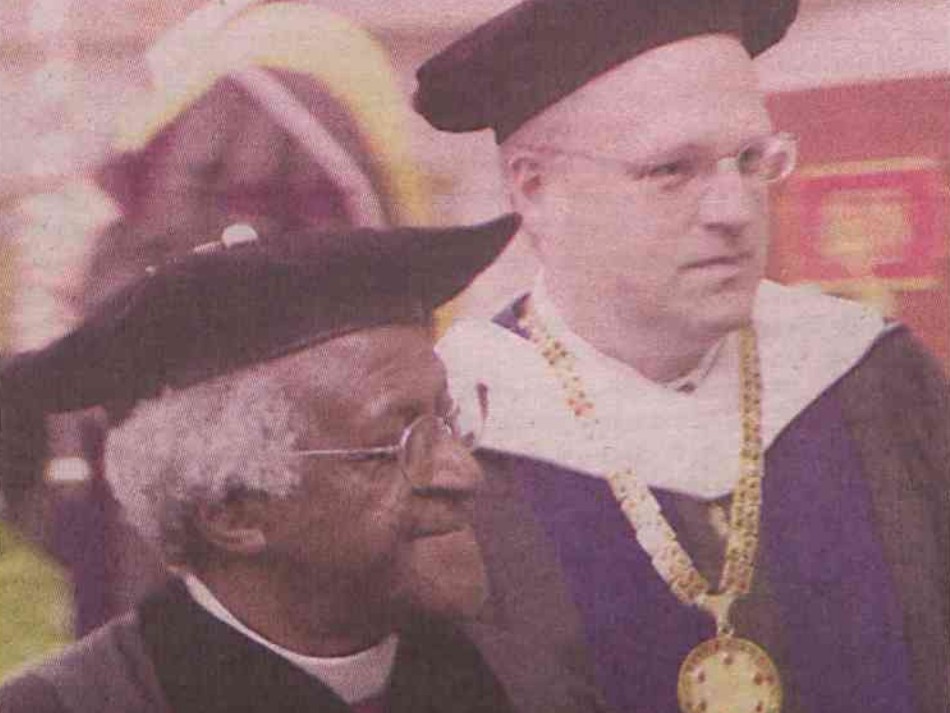In this edition of #ElonTBT, we rewind to 2003 when Archbishop Desmond Tutu gave a speech about forgiveness during the Spring Convocation for Honors at Alumni Gym.
In the #ElonTBT series, the Elon University News Bureau, along with Archives & Special Collections, will flash back to the past to take a look at Elon over the years. You will find videos, newspaper clippings, photos and more to celebrate Elon’s past, while looking ahead to the future. Follow along on Today at Elon and the university’s Twitter, Facebook and Instagram pages every Thursday to see what we dig up.
Thousands of people packed into Alumni Gym nearly 17 years ago to hear from Archbishop Desmond Tutu, the South African cleric who fought the apartheid system and championed human rights around the globe.
Tutu’s keynote address, “No Future Without Forgiveness,” was part of the April 2, 2003, Spring Convocation for Honors, which celebrated Elon seniors named to the President’s List and Dean’s List in 2002.
Tutu spoke to a sold-out audience of 2,800 people, discussing the trials and tribulations of the South African system of institutionalized racism known as apartheid. He told stories about the battle to bring down the system and the importance of forgiveness in the nation’s journey toward unity.
“We came to realize forgiveness is not something nebulous – a namby-pamby thing meant for religious people or others who are sentimental,” Tutu said. “It isn’t just a facile slogan. There is no future without forgiveness.”
Tutu worked as a pastor, educator and administrator in South Africa and received the Nobel Peace Prize in 1984 for his commitment to achieving racial equality by peaceful means. His nonviolent protests helped lead the charge against apartheid, which was brought to an end with the formation of a democratic South African government in 1994.
During his Convocation for Honors address, Tutu explained the key to attaining peace is understanding what we have in common with others.

“We are all bound up together, and God’s dream is that you and I and all of us will help God realize God’s dream, that we belong in this family in which there are no outsiders – all are insiders,” he said.
In recognition of Tutu’s humanitarian efforts, Elon awarded the archbishop an honorary doctorate at the 2003 ceremony. The Honorable Henry E. Frye, Sr., former chief justice of the Supreme Court of North Carolina, presented Tutu with the Doctor of Humane Letters, which was conferred upon him by President Emeritus Leo M. Lambert.
“Sustained by his deep faith in God and his conviction that racial segregation is evil, Archbishop Desmond Tutu rose up like a profit of old to denounce apartheid in South Africa,” said Lambert, who read a citation before congratulating Tutu on the honor. “With steadfast courage, he spoke out against injustice and exploitation and used the tools of nonviolent protest to focus world attention on the oppression of non-whites in his homeland.”
University Chaplain Emeritus Rev. Richard W. McBride gave the invocation during the ceremony and called it an honor to have Tutu speak at Elon.
“It must not escape our notice that Archbishop Tutu confronted the evils of apartheid – not through violent action but by declaring, persistently, a vision of human community, which exposed that evil at its core,” McBride said.
Do you have any special pieces of Elon history? Share your photos and videos with us via email at news@elon.edu or using the hashtag #ElonTBT on Twitter, Facebook and Instagram.



